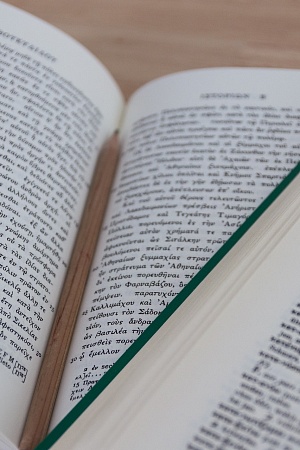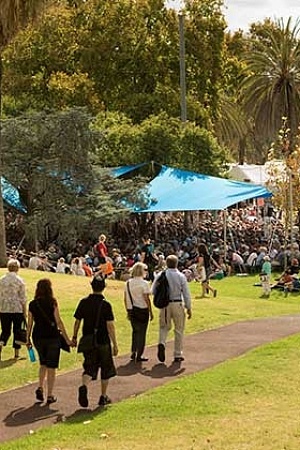Dishonouring our writers
Each year on Australia Day, newspaper readers disinter their magnifying glasses and begin to inch down the columns of this year’s national honours like proofreaders at a gala ball. And each list produces its surprises, its gratifications and its absurdities. Normally, ABR doesn’t concern itself overmuch with prizes and such. Laurels grow like grapes in this country. But the absence of creative writers this year was so marked as to warrant comment.
ABR is not the only malcontent in this regard. On Australia Day, David Marr published an article titled ‘Where are the ridgy-didge artists?’ (Sydney Morning Herald). Marr highlighted the paucity of actors, directors, playwrights, dancers, poets, screenwriters, and composers on the list, and expressed the hope that next year’s list might reflect ‘the Australia we most admire’. Reading this article, I thought of withdrawing from the field. David Marr – one of our finest and most forensic journalists – had put the case well for greater inclusion of creative artists, and he doesn’t need my endorsement. But then I began to consider the proportional representation of authors, and persevered.
As always, there are at least a couple of ABR connections, which is pleasing. Louise Adler – currently the CEO at Melbourne University Press – edited the magazine in 1988. She gets an AM (as does Patrick Gallagher, Executive Chairman and Publishing Director of Allen & Unwin, Australia’s largest independent publisher). Susan Crennan (AC), a Justice of the High Court of Australia, served on the ABR board in the 1990s. Elsewhere, Ann Galbally (of the University of Melbourne), who has published extensively in art history, received an AM. Diane Langmore, departing General Editor of the Australian Dictionary of Biography, also got an AM. Veteran literary agent Rosemary Creswell received an OAM.
These are worthy recipients, and we congratulate them. But where are the creative writers, those without senior academic or professional careers? An inspection of the complete list of recipients of the AC, the AO, the AM and the OAM since the scheme’s creation in 1975 (see www.itsanhonour.gov.au) is very revealing.
The proportion of literary recipients is small, and declining. (Compare it with sportsmen and -women or captains of industry and one’s spirits wilt.) In recent years, practically everyone cited for ‘service to literature’ has had another significant career (often one for which they are principally known) – e.g., professor or emeritus professor, jurist, educationist, publisher, editor, critic. There are few full-time creative writers: the novelists and poets and dramatists who work in solitude, without tenure or salaries, often with minimal financial security and superannuation.
Almost invariably in recent years, those who have been gonged have been so at the lower levels – and let’s not be coy about the hierarchy built into this system. The gradations (AC, AO, AM, OAM) are stark, and keenly noted. Here we must cite the ludicrous case of Peter Porter’s OAM in 2004, which can only be attributed to a stubborn resentment that this Brisbane-born writer has chosen for half a century to contribute at the highest level to English-language poetry from London rather than on the Loddon.
David Marr, in his SMH article, mentioned several notable writers ‘still to be recognised by the nation’: Helen Garner, Peter Carey, Shirley Hazzard, Alex Miller, Kate Grenville, and Tim Winton.
It is possible – likely, even – that some writers have declined to be nominated for national honours. Some may have no desire to receive such honours from the Council of the Order of Australia, chaired as it is by the queen’s representative in Australia. It is also possible that some writers have declined national honours on being offered one. In this they would be echoing the war historian C.E.W. Bean who in 1940 politely declined a knighthood thus: ‘I have for many years believed that in Australia the interests of the nation would be best served by the elimination of social distinctions … [I]t seems to me that in practice, despite certain advantages, the system encourages false values among our people.’
A genteel convention encourages, perhaps even requires, those so minded not to promulgate their decision to decline national honours. They doubtless form a notable cohort – a kind of salon des refusés. But in a way that is beside the point. The present system is a fait accompli, unlikely to change; and it should be a balanced and inclusive one.
Australians, proud of their supposed classlessness, tend to disparage British honours (all those archaic knighthoods), but a glance at the list of the highly prestigious, twenty-four-strong Order of Merit (in the gift of the monarch) is instructive. Tom Stoppard, Lucian Freud, Anthony Caro, David Attenborough and a certain Australia coloratura soprano are there. How conservative our body of AC’s (all 405 of them to date) looks by comparison, with its preponderance of businessmen, multi-millionaires or billionaires, wealthy philanthropists, jurists and vice-regents, and former politicians and public servants.
The following have all received an AC: Nicole Kidman, Rupert Murdoch, John Coates, George Pell and Kerry Packer. Why not some of these: Rosemary Dobson (AO, 1987), Tom Keneally (AO, 1983) Christopher Koch (AO, 1995), David Malouf (AO, 1987), Frank Moorhouse (AM, 1985), Les Murray (AO, 1989)? Note the dates. Most of these writers have been rather productive since then. But evidently, national values and priorities have changed.
If we must have national honours, if we really believe that exceptional people should be lauded in this way, then creative writers should be represented alongside the moguls and the cricketers and the film actors and the swarm of state governors. Otherwise we will end up with a mickey-mouse system that no one respects – another cosy club for the wealthy, the powerful, and the well affiliated.











Leave a comment
If you are an ABR subscriber, you will need to sign in to post a comment.
If you have forgotten your sign in details, or if you receive an error message when trying to submit your comment, please email your comment (and the name of the article to which it relates) to ABR Comments. We will review your comment and, subject to approval, we will post it under your name.
Please note that all comments must be approved by ABR and comply with our Terms & Conditions.